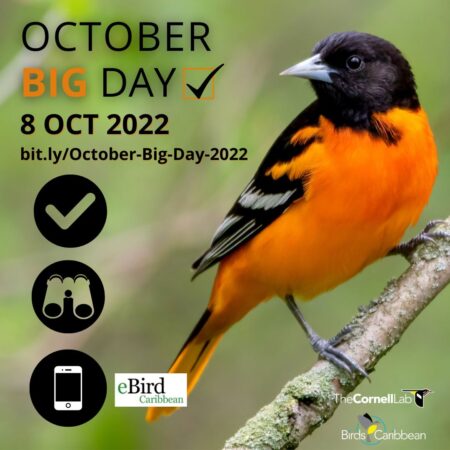
Get ready, get set, let’s go birding! The biggest day of birding in the fall season, October Big Day, is right around the corner! On Saturday October 8th, October Big day and World Migratory Bird Day (WMBD) are celebrated in the Caribbean and around the world. This 24-hour birding opportunity lands right during some of the peak activity for bird migration. It’s also a great day to participate in educational activities about migratory birds for WMBD – the theme is Dim the Lights for Birds at Night! Check with your local organizations to see if any events are planned.
The goal for October Big Day is to get outside to watch, celebrate, and record your resident and migratory birds! You can bird in your backyard, neighborhood park, seashore or woodland. Watch birds for as little as 10 minutes in your local birding patch or plan out a route to find as many bird species as possible in 24 hours. No matter what, we hope you will get outside and go birding!
Like Global Big Day celebrated in May, it is hoped that this concerted effort will bring in a record number of bird sightings from citizen scientists around the world, contributing to our bird knowledge and a deeper understanding of conservation.
Where are the birds, and what are they doing?
The data collected will be used by birders and scientists to better understand and protect birds. This is also an opportunity for the individual birdwatcher to contemplate birds, their behavior, and the places where they may be found. For example, are there birds you are only likely to see in the late morning or early afternoon? And if so, are they at specific locations? Tanagers and bullfinches are often very active during the morning hours. As the day heats up, you may see raptors soaring above. Seagulls and shorebirds can be observed at almost any time of day. Migratory warblers generally show up in early morning or evening hours, feeding and bathing in suburban gardens and parks.
Make your birding count—submit & share your data!
Participating is easy with the essential tool, eBird, where you should record all the birds you see (and even hear) on Saturday 8th October via the eBird website or mobile app. If you’re in the Caribbean, be sure to use eBird Caribbean (and choose the eBird Caribbean portal in your eBird app settings on mobile). If you do not already have one, it’s easy to sign up for a free eBird account and here’s a quick guide on how to use eBird. Eager birders should spot as many birds as they can from midnight to midnight in their local time zone on October 8th. Or bird anytime during the weekend of Oct. 7-9 for the Global Bird Weekend. The handy mobile app allows you to keep and submit lists while you’re still out birding, perhaps exploring nearby Hotspots. It will even track how far you have walked while watching birds. Remember to submit eBird checklists before October 12, 2022 to be included in the initial results announcement!
Share your sightings with us, and join BirdsCaribbean!
We look forward to seeing your stories and photos on social media. You can find us on Facebook and on Twitter and Instagram @birdscaribbean. Be sure to tag us! If you’re not on social media, consider joining our discussion group where you’ll be able to share your October Big Day experience with over 850 members.
May we remind you that BirdsCaribbean membership has so many benefits; for a reasonable membership fee you are entitled to a FREE subscription to Birds of the World ($49 value) – the most comprehensive online resource on birds. Additionally, you may receive discounts on our products, workshops and conferences; meet and network with fellow birders, scientists, educators and conservationists across the region; and keep in touch with birding trends and news through our monthly newsletters (free sign-up here). Join us today and help us save our Caribbean birds and their important habitats!
See you on October Big Day 2022 – and let’s see some birds!
Most importantly, have fun and don’t forget to tag BirdsCaribbean (@BirdsCaribbean) in your birding adventures! We can’t wait to see which of our migratory friends have arrived to the Caribbean!
